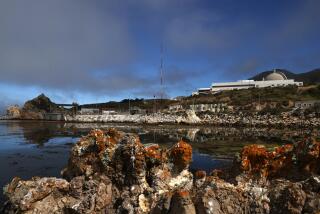Watkins Sets Up Strict Rules at Weapons Plant : Safety: Energy secretary shakes up management, says Rocky Flats plutonium facility will stay shut until hazards are dealt with.
- Share via
GOLDEN, Colo. — Energy Secretary James D. Watkins said Friday that plutonium operations will be halted indefinitely at the Rocky Flats nuclear weapons plant until all safety concerns are met.
Watkins also announced a major management shake-up at the plant, and said the new management structure will make the plant more responsive to safety concerns.
Watkins made the announcement after receiving a report from a federal advisory committee that said the management at Rocky Flats “has not integrated environmental issues into the overall management plan.” The committee also said “the operating staff must assume the responsibility of making the facility a professional place--it is not today.”
“Although no major hardware problems were identified by the Department of Energy team, conduct of operations, standards of performance, engineering support and management structure remain deficient,” Watkins said at a news conference after touring the plant.
The weapons plant, which makes plutonium triggers for nuclear weapons, already has scaled back plutonium operations 20% and soon will stop them altogether, Watkins said, as part of its normal end-of-year shutdown for inventory.
Watkins acknowledged that any long-term shutdown could seriously affect America’s nuclear weapons capability. The plant is the only one of its kind in the United States.
“Rocky Flats is critical (to U.S. defense), we can’t have it shut down for long periods of time,” Watkins said. “But, it will not start up unless it is safe. Production will not take precedence over safety.”
He estimated that it could be mid-January before operations resume.
He said the plutonium operations will remain shut down until he and EG&G; Inc., which will take over as operator of the plant from Rockwell International Corp. starting Jan. 1, are satisfied the safety concerns are met. Among the safety concerns mentioned by Watkins on Friday was accumulation of plutonium dust in ductwork at the plant.
The advisory committee said that “significant amounts” of plutonium have accumulated in the vents.
Initial reports indicated there was enough plutonium present to cause “criticality,” or a nuclear reaction, but another study found there was less plutonium present in the ducts than originally thought. Both reports said there was no evidence a reaction had occurred.
Watkins said the criticality issue is serious, but does not pose a public safety threat.
“Nevertheless, because it is an important safety issue, I am asking EG&G; to independently review the report’s findings and produce their own action plan,” he said. “This is an important enough issue that we will not resume plutonium operations until we have taken action to address plutonium criticality.”
Rocky Flats has been the nation’s most troubled nuclear weapons facility over the past year, and has become a burning political controversy here. Recent reports have identified lax procedures for handling plutonium and other toxic materials at the plant, which is located only 10 miles from Denver’s populous suburbs. Last spring, Federal Bureau of Investigation agents began clandestine monitoring of the facility and later charged the plant with major violations of state and federal environmental laws.
Watkins announced last summer what he called a major policy change in his department. From now on, he said, safety concerns would take priority over production schedules. He also fired Rockwell as manager of the plant.
Gov. Roy Romer, who also was present at Watkins’ news conference, said the decision to halt all plutonium processing shows a new commitment by DOE to safety issues, but said with the department’s record of past safety violations, he wants to see proof.
Romer said it was a mistake to build the nuclear weapons plant so close to a metropolitan area, 16 miles northwest of Denver, but said it would take 15 years to move it.
“It’s obvious that the proof is in the pudding, and it’s my job as governor of Colorado to make sure the citizens are safe,” Romer said.
Romer has not called for the plant to be shut permanently, however. According to a University of Colorado study, Rocky Flats provides 6,000 jobs with average annual pay of $48,000 in an economy still hurt by the oil bust of the mid-1980s.
Watkins admitted that DOE made major mistakes at Rocky Flats.
“We did not bring our management into the modern world and we’re going to do that now,” he said.
He said poor management at the facility had made it difficult for workers to do their job properly, and that would have to change. He said it also is necessary to gain the public’s respect.
“Of course we have a credibility problem. What we are trying to do now is regain it,” he said.
He said operations will resume on a building-by-building basis, with new criteria.
Among the criteria are the development of system drawings, verification that all alarm systems are operational, verifying that required maintenance has been completed, and that workers are properly trained.
Times researcher Ann Rovin in Denver contributed to this story.
BACKGROUND The Rocky Flats nuclear arms plant near Denver, one of 17 owned by the Department of Energy, makes plutonium triggers for atomic weapons. In recent months the plant has been criticized for lax handling of plutonium and other toxic materials. Last spring, FBI agents spied on the facility and later charged the plant with major violations of state and federal environmental laws. Rockwell International was subsequently fired as manager at Rocky Flats.
More to Read
Sign up for Essential California
The most important California stories and recommendations in your inbox every morning.
You may occasionally receive promotional content from the Los Angeles Times.











